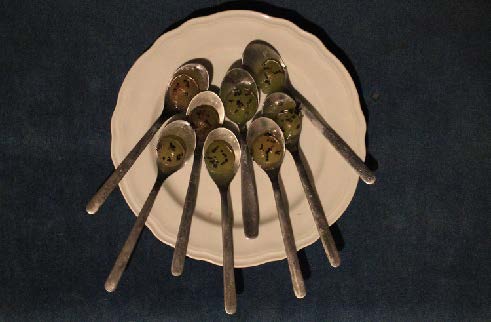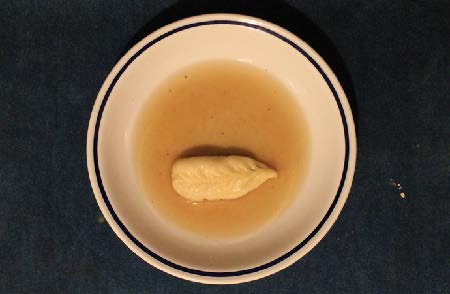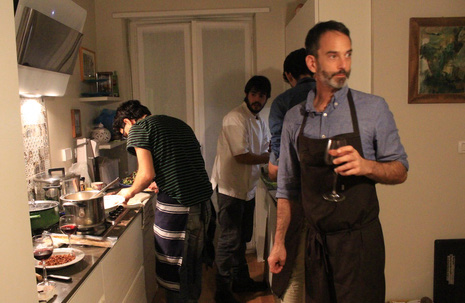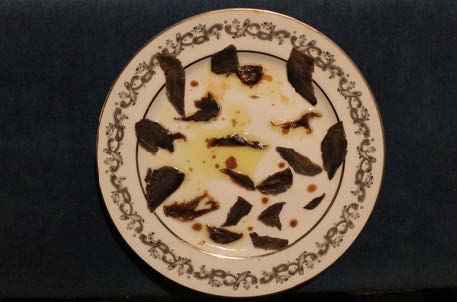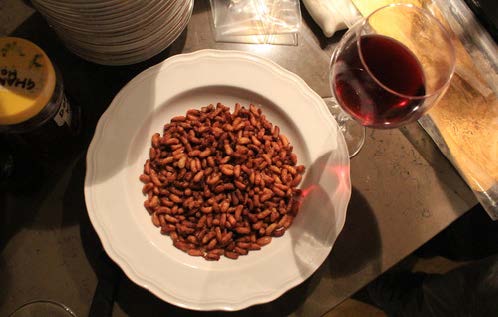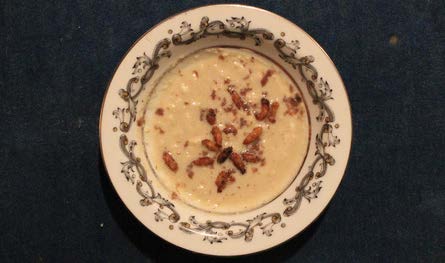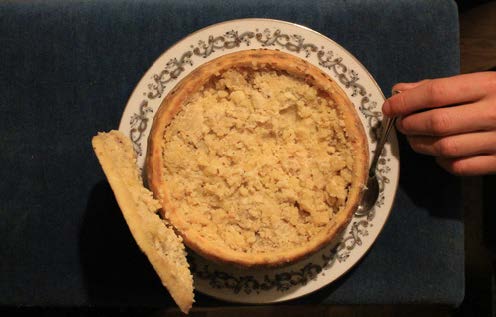by Josh Evans
On the last Sunday in October, we got a reality check. A nice big one with lots of drama.
We had been planning a tasting workshop at Salone del Gusto in Torino, Italy, as part of Terra Madre, the biennial Slow Food event devoted to celebrating the diversity of food products and cultures around the world. Our goal was to share the taste diversity of this largely undervalued and misunderstood (in The West, at least) class of foods. We were going to serve some tasters and use them to illustrate some of the principles we have learned on our field work, techniques we have brought into our kitchen and different strategies for engaging with these different organisms as ingredients in their own right, rather than just novelty food.
We came up with the original idea for the workshop back in May, which was to gather the most delicious insects we had tried on our field work around the world, along with the producers who procure them, and cook them in both traditional and more experimental recipes to show how delicious and versatile some insects can be – and how they are already a well-established delicacy in many places around the world.
Then, in the summer, we were informed by Slow Food that we would no longer be able to bring insects from outside the EU (Ebola scare maybe?). This was a minor setback but we rolled with it and embraced the constraint, trying to find the best insects we could in Europe and using ideas from the field work to incorporate different insects into a European culinary context.
On Thursday, three days before the event, with all of our mise en place (including special paperwork for the insects) in order, we flew to Torino to make our final preparations.
After a couple long days of coordinating the last pieces, we started the day on Sunday by having to protect our mise en place from being forcibly thrown away, There were lots of hysterics and no explanation.
Eventually we found ourselves in a calmer context, where some of the Slow Food organisers explained the situation. Apparently, the day before, there was supposed to have been a tasting of insect dishes made by a chef from France, which had been shut down by Slow Food in anticipation of the arrival of the notoriously restrictive Italian health authorities. Moreover, despite Slow Food’s skittishness, an impromptu insect tasting had also been held at the Ark of Taste – a huge repository of endangered edible species and products from around the world – with edible insects from Mexico that had gained import approval only as objects for exhibition. Both incidents had gained some attention and the following day, Sunday, had seen an article published in the city newspaper of Torino describing the course of events. This publicity was enough to cause Slow Food an understandable degree of alarm, for if our workshop were to also attract such attention it would be possible for the city police to shut down Salone del Gusto completely. And so our workshop as we had envisioned it became impossible to deliver, even to a self-selecting group of enthusiastic participants from around the world.
We began discussing alternatives with the Slow Food organisers. They proposed we could do the workshop just without the servings, or serve the tastings just without the insects. Both options seemed to us sort of silly, as the whole point of the workshop was to illustrate and talk about the actual insects. We proposed perhaps getting around the legislative risk by not ‘serving’ per se, but simply making the dishes and letting the participants decide for themselves if they would eat them (an area still too grey for their liking), or holding the workshop off-site altogether to not risk total shutdown.
In the end, since we could not share our work the way we needed to, we decided the best thing would be to cancel the workshop. It was disappointing and frustrating for most people involved. We came to the workshop room with all our participants ready, and had to tell them the news. The Slow Food folks were very good, explaining their responsibility and the situation, and offered reimbursement as well as a free book by Carlo Petrini. Roberto and I explained what we had hoped to share in the workshop, and at the request of the participants we described what the menu would have been and what we were trying to illustrate with each serving.
Here is the menu as we would have served it:
Aperitivo
Anty Gin and pure ant distillate.
Red wood ants (Formica rufa) and Smelling carpenter ants (Lasius fuliginosus) with celery and chili
Salad
parsely root, cream, kombucha and fried bee larvae (Apis mellifera)
Soup
dashi of house crickets (Acheta domesticus) with grasshopper garum (Locusta migratoria) and Kenyan termite mound mushrooms (Termitomyces sp.)
Bread and Cheese
casu marzu (Piophila casei), pane pistoccu, cannonau
Mont Blanc
chestnut paste, bee larvae cream (Apis mellifera), acacia honey
We will post more information on each dish and the research behind them in the new year.
After this fateful Sunday, we felt the need to dig deeper into the EU Novel Foods Legislation to understand a bit more how it had led to this unfortunate series of events, and what all of us who are working ‘on the frontier’ of what is considered legal are dealing with.
Novel Foods
The grounds upon which the workshop was shut down seem to revolve around the European Commission law EC 258/97 on Novel Foods. The Commission signed the law into effect in 1997, stating that “foods and food ingredients that have not been used to a significant degree in the EU before 15 May 1997 [are] novel foods and novel food ingredients” and that “they must be safe for consumers [and] properly labelled to not mislead consumers.”[EC 258/97]
The impulse behind the legislation seems noble enough – probably a desire to protect EU lands from an onslaught of untested, potentially harmful new food additives. Yet going a little deeper into the legislation reveals a more complex situation. The Review of Regulation (EC) 258/97 describes itself as related “in particular to food produced using new techniques and technologies, such as nanomaterials.” [EC 258/97 Review] Furthermore, there are relevant areas which the Novel Food Regulation nonetheless explicitly does not cover – “food and ingredients for which an approval exists, [namely:]
§ Food additives within Regulation EC 1333/2008;
§ Flavourings for use in foods within Regulation EC 1334/2004;
§ Extraction solvents used in the production of foods within Directive 2009/32/EC – approximating EU countries’ laws;
§ GMOs for food and feed – Regulation EC 1829/2003;
§ If foods and/or food ingredients were used exclusively in food supplements, new uses in other foods require authorisation under the Novel Food Regulation e.g. food fortification require authorisation.”
Morever, particulary since 2009, the Novel Food Regulation seems to concern itself strongly with cloning and food from cloned organisms (ibid.).
All this had us wondering: shouldn’t a class of foods as diverse, as widespread, as traditional and as celebrated as insects be treated under slightly different legislation than that which concerns itself primarily with food additivies, artificial flavourings, extraction solvents, clones, and GMOs?
One year ago, in December 2013, the Commission adopted new proposals to the legislation, among which were “special provisions… made for food which has not been marketed in the EU but which has a history of safe use in non-EU countries. This creates a more balanced system and a positive environment for trade.” One would expect certain insect species to be included in these provisions – but perhaps only in the event one submits an application for authorisation.
This authorisation is given by individual EU member states. Our situation occurred in the grey area when member states have different standards for authorisation – and different attitudes towards the same ‘novel’ food product. These different standards are further complicated by the large cultural variation in the legislative criteria for establishing “a history of human consumption to a significant degree,” such as valid types of documentation, geographical scale of consumption, ‘appropriate’ quantity of use, intended purpose (eg. crossover with medicinal and cosmetic functions), methods of processing, different properties among parts of the same organism, prevalence in private vs. public domains, and commerical value, among others.
All of this variation in criteria standards means that despite the goals of the legislation to provide safe foodstuffs and transparent information to consumers and businesses, there is still a lot of room for misinformation and unfounded cultural biases to generate fear of ‘novelty’ where there is no need for it.
There does exist a centralised “Novel Food Catalogue”, which “lists products of plant and animal origin and other substances subject to the Novel Food Regulation, after EU countries and the Commission agree in the Novel Food Working Group.” However, “it is non-exhaustive, and serves as orientation on whether a product will need authorisation under the Novel Food Regulation. EU countries may restrict the marketing of a product through specific legislation. For information, businesses should address their national authorities.”
The salient point in Torino was the different ways that different member states respond to foods that are not explicitly authorised by the Novel Foods Regulation, but that have compelling evidence for their consideration – such as widespread, culturally and ecologically contextual, and safe use for centuries in other places in the world. In Denmark, for example, no insect species are officially authorised but we have never encountered such pushback. Nor have we in the Netherlands, Sweden, Norway, Germany, or the UK, where we have also shared some of our work.
It was of course a disappointment to be shut down – but it was also fruitful, opening our eyes again to the challenges of this work and bringing us to commit ourselves again to the battle of diversifying food systems through taste. We saw the depth of the psychological barriers to such unknown foods in action, and experienced firsthand the necessity for better, more informed legislation and its execution. We need to give this support not just to insects but to all sorts of traditional, wholesome foods with the potential to diversify our taste and our food systems, which are prevented from doing so in part due to unclear legislation and its misapplication.
But we didn’t let the day get us completely down. We still had almost all of our mise en place (we had managed to salvage and stash most of it from those who would have thrown it away) and ended up arranging an impromptu dinner party tasting for about fifteen of our friends. Gold stars for the evening go to our newfound Salone friend Steven Satterfield, chef of Miller Union in Atlanta, Georgia, who let us use his rented apartment in Torino and cooked with us, and Enrico Cirilli, Roberto’s good friend from Sardegna and our unfailing sous-chef for the whole weekend. We couldn’t have made it happen without them.
The menu from the evening ended up looking something like this.
Grapes, ants, anty gin
Cured tuna heart, olive oil, grasshopper garum
Culurgiones (Sardinian ravioli with pecorino, potato and mint), broth of house crickets and termite mound mushroom
Chestnut soup, bee larvae, fermented pollen
Poached egg and grits, country ham and redeye gravy
Radicchio, Kale, Savoy cabbage with orange and grana padano
(the Southern flair from Steven)
Casu marzu
It was a cozy night and we were happy to be able to do what we came to Italy to do, even if it ended up a bit differently than we had planned.
Incidentally, a few weeks later, right after we had returned from some field work for our insect research in Japan, there came out an article recounting the complete shut-down of a restaurant in Milan that was also trying to serve insects.
Food safety is very important for sure – but so is acting on proper information and supporting responsible experimentation. There is still a ways to go. The fight is on, and so we do what we know best: we cook.
